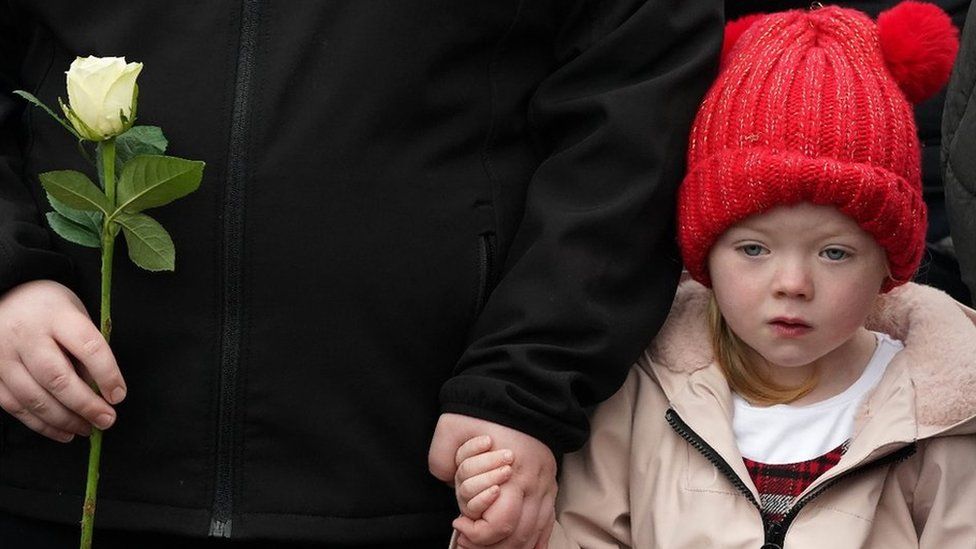Taoiseach (Irish prime minister) Micheál Martin has laid a wreath at a ceremony in Londonderry to mark the 50th anniversary of Bloody Sunday.
The memorial is part of a series of events being held in Derry on Sunday.
Thirteen people were shot dead when soldiers opened fire on civil rights demonstrators in Derry on 30 January 1972.
Earlier, relatives of those killed retraced the steps of the original march.
Bloody Sunday brought worldwide attention to the escalating crisis in Northern Ireland, which came to be known as the Troubles.
The Bloody Sunday families have laid photographs of their loved ones at the memorial in Derry’s Bogside.
Kay Duddy, whose 17-year-old brother Jackie was the first person to be shot on Bloody Sunday, said “it hurts as much 50 years on as it did at the time”.
“We did not just lose a wee brother, we lost a whole generation. There’s so many unanswered questions, would he have married? Would he have had a family?
“That is a very, very hard pill to swallow”.

Irish Foreign Affairs Minister Simon Coveney, Sinn Féin president Mary Lou McDonald, Foyle MP Colum Eastwood and Alliance deputy leader Stephen Farry also attended the memorial service.
Presbyterian minister Dr David Latimer told the crowd the Bloody Sunday families have “tirelessly, across the decades, toiled to clear their loved ones’ names”.
He said their fight for justice has been inspirational across the world.
On Wednesday, Prime Minister Boris Johnson paid tribute to victims’ families during Prime Minister’s Questions.
Mr Johnson described Bloody Sunday as “one of the darkest days in our history” and said in the run up to the anniversary “we must learn from the past, reconcile and build a shared and prosperous future”.

Walking in the footsteps of lost loved ones
At the scene: Mike McBride, BBC News NI
It was a walk of remembrance for the relatives of those killed on Bloody Sunday, who set off from Creggan.
They followed a similar route to a civil rights march that was staged in this city half a century ago.

A January day that started in peaceful protest, but ended in tragedy. Spectators have lined the streets in a show of solidarity with the families.
John Kelly, the brother of Michael Kelly, handed out a white rose to a child representing each of the Bloody Sunday families.
Each rose a life lost.
A ripple of applause broke out in the crowd as the Bloody Sunday families, linked arm in arm, march purposefully through the streets of Derry.

Ahead of the 50th anniversary, ex-prime minister David Cameron said his 2010 apology for Bloody Sunday made it clear there was no doubt what happened was wrong.
When the Saville Inquiry was released, Mr Cameron apologised for the “unjustified and unjustifiable” deaths.

Police have warned motorists to expect delays in the city on Sunday.
They said some diversions may be necessary and advised drivers to allow extra time for journeys in and around Derry.

What happened on Bloody Sunday?
Thousands gathered in Derry on that January day for a rally organised by the Northern Ireland Civil Rights Association.
They were protesting against a new law giving the authorities powers to imprison people without trial – internment.
The Stormont government had banned such protests, and deployed the Army.

The intended destination of the demonstrators was the city centre, but Army barricades blocked marchers, so many demonstrators headed towards Free Derry Corner in the Bogside.
After prolonged skirmishes between groups of youths and the Army, soldiers from the Parachute Regiment moved in to make arrests.
Just before 16:00 GMT, stones were thrown and soldiers responded with rubber bullets, tear gas and water cannon.
At 16:07 GMT, paratroopers moved to arrest as many marchers as possible. At 16:10 GMT, soldiers began to open fire.

Jean Hegarty, whose 17-year-old brother Kevin McElhinney was shot and killed on Bloody Sunday, said it was hard to believe 50 years had passed.
Kevin, who worked at a local supermarket, was killed as he attempted to flee the firing on Rossville Street.

“It never gets easier to talk about, even after all this time, for some of us [the Bloody Sunday families] it still sadly feels like it happened just yesterday,” Ms Hegarty told BBC News NI.
She says Sunday is an extremely emotional day for the families.
Irish President Michael D Higgins deliver a recorded message to the Bloody Sunday families during a special event at the Millennium Forum.
The Irish president is expected to commend the people of Derry for leading the way in finding agreements and accommodating others and their traditions, and keeping the victims’ memories alive.
It will take place in front of a limited number of people but will also be live streamed to an online audience.
The Millennium Forum will then fall silent at the precise moment when, on January 30, 1972, members of the Parachute Regiment opened fire in the Bogside.

The years after Bloody Sunday

Two public inquiries have been carried out into the events of Bloody Sunday.
The Widgery Tribunal, which was announced shortly after Bloody Sunday, largely cleared the soldiers and British authorities of blame.
The Saville Inquiry, published in 2010, found none of the casualties was posing a threat or doing anything that would justify the shooting.
The Police Service of Northern Ireland (PSNI) began a murder investigation in 2010.
Detectives submitted their files to the Public Prosecution Service (PPS) towards the end of 2016.
Prosecutors said in 2019 they would prosecute a soldier, known only as Soldier F, for the murders of James Wray and William McKinney on Bloody Sunday.
On 2 July 2021, it was announced Soldier F would not face trial following a decision by the PPS.
The decision not to proceed with the case is now the subject of live judicial review proceedings following a legal challenge brought by a brother of one of the Bloody Sunday victims.


























